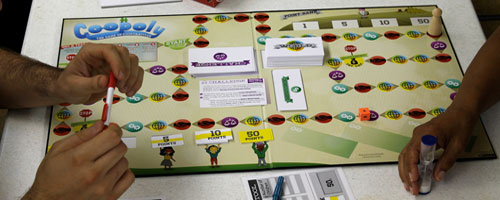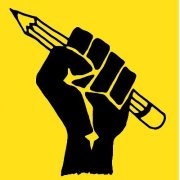Crowdfunding, coworking, and open source have remade the world in substantive, meaningful ways and changed the course of how we conduct creative projects and business transactions alike. At the Toolbox for Education and Social Action, we put these new models to use making the widely celebrated board game, Co-opoly: The Game of Cooperatives. In less than a year, we’ve sold nearly 1,000 copies of Co-opoly to people in 20 countries around the world, which surpassed our wildest expectations. Like the models that inspired us, Co-opoly also tries to break the mold, redefining how we learn and play, and especially how games are made.

Co-opoly is distinctive; to our knowledge, it’s the only board game that follows the fair trade ethic from conception to production. We wanted the game production to mirror the spirit of the game, which is about the principles of the cooperative movement, non-exploitation, and treating workers with dignity and respect. Instead of seeking the cheapest possible game components (which are typically manufactured in sweatshops), we decided to produce Co-opoly as ethically and sustainably as possible. We realized this goal by working only with co-ops or ethical businesses to produce the game, and, to minimize the environmental impact of shipping, we found these companies as close to home as possible. Our game is printed on recycled and FSC Certified paper, and the components can all be reused and recycled. In addition, we assemble each game ourselves.

Breaking with the traditional chain of production required considerable financial resources. Our effort to make Co-opoly environmentally sustainable and economically viable relies on a community-driven model; it is a game by and for the co-op movement. When Co-opoly was just a nascent idea, and the board was patched-together sheets of paper from our office printer, donors saw the promise of a teaching tool that both embodied the principles of democratic education, and was the kind of game you’d want to bring to a party. In the spirit of mutual aid, we rewarded our backers with Kickstarter gifts and built relationships between the game and our real-life supporters. As a result, you can play Co-opoly as any number of real-life co-ops now. Moreover, food co-ops are the biggest retailers of the game, which brings revenue into the movement.
Now, we’re setting the bar even higher, and we will double the number of games we’re producing. This second edition has the potential to reach more than 20,000 people, and all of the game components will still be American-made, still come from sustainable resources, and still be created by other co-ops or ethical businesses.
We stand on the shoulders of giants when we make use of shareable models, which is why they prove so durable and resilient. TESA is inspired by the story of Spain’s Mondragon Cooperative System, which got its start through crowdfunding. Arizmendi, a priest and one of the movement’s founders, placed ballot boxes around the town of Mondragon. He asked people if they wanted a school that would help, in sum, create jobs in the town. Those who voted yes were asked if they would contribute a small amount of money to make the project possible. Small contributions from a broad range of individuals allowed Arizmendi to start the school that eventually led to the creation of the Mondragon system we know today.
We are trying to make Co-opoly possible while following in these footsteps: by turning to our community and asking if they would like to see this powerful tool for the co-op movement live on. If you think these models can be successful, please consider contributing to Co-opoly 2.0 today. Individuals and organizations can receive rewards and benefits in return for helping us make this happen. In addition, we’ve still got a small number of games in stock for those who haven’t had a chance to play it yet!









